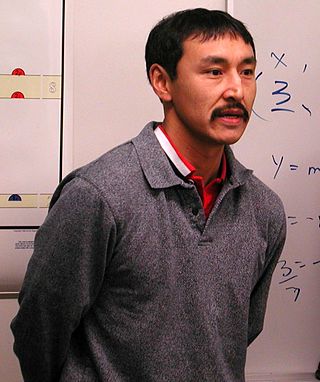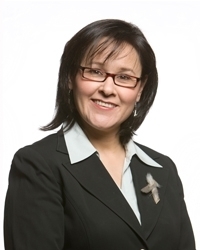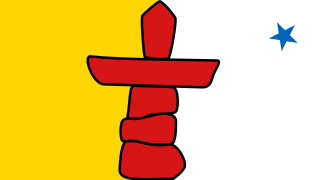Related Research Articles

Iqaluit is the capital of the Canadian territory of Nunavut. It is the territory's largest community and its only city, and the northernmost city in Canada. It was known as Frobisher Bay from 1942 to 1987, after the large bay on the coast on which the city is situated. Its traditional Inuktitut name was restored in 1987.

Paul Okalik is a Canadian politician. He is the first Inuk to have been called to the Nunavut Bar. He was also the first premier of Nunavut.
Traditional Inuit music, the music of the Inuit, Yupik, and Iñupiat, has been based on drums used in dance music as far back as can be known, and a vocal style called katajjaq has become of interest in Canada and abroad.

Resolute or Resolute Bay is an Inuit hamlet on Cornwallis Island in Nunavut, Canada. It is at the northern end of Resolute Bay and the Northwest Passage and is part of the Qikiqtaaluk Region.

William Joel MacDonald Plaskett is a Canadian rock musician and songwriter based in Halifax, Nova Scotia. He was a member of Halifax alternative rock band Thrush Hermit in the 1990s. Plaskett performs in a number of genres, from blues and folk to hard rock, country, and pop.

There are an estimated 850 km (530 mi) of roads and highways across the Canadian territory of Nunavut, which is the only province/territory not connected by road to other parts of Canada.

Leona Aglukkaq is a Canadian politician. She was a member of the non-partisan Legislative Assembly of Nunavut representing the riding of Nattilik from 2004 until stepping down in 2008; then was a Conservative Member of Parliament representing the riding of Nunavut after winning the seat in the 2008 federal election. She was the first Conservative to win the seat, and only the second centre-right candidate ever to win it. Leona Aglukkaq is the first Inuk woman to serve in cabinet. She remained an MP until she was defeated in the 2015 federal election by Liberal candidate Hunter Tootoo. Aglukkaq unsuccessfully contested the 2019 federal election.
Road to nowhere may refer to:

Nunavut is the largest and northernmost territory of Canada. It was separated officially from the Northwest Territories on April 1, 1999, via the Nunavut Act and the Nunavut Land Claims Agreement Act, which provided this territory to the Inuit for self-government. The boundaries had been drawn in 1993. The creation of Nunavut resulted in the first major change to Canada's political map in half a century since the province of Newfoundland was admitted in 1949.

Waskada is an unincorporated urban community in the Municipality of Brenda – Waskada within the Canadian province of Manitoba that held village status prior to January 1, 2015. It is located in the southwest corner of the province, close to the United States and Saskatchewan borders. It was settled as early as 1883 and incorporated as a village in 1948. Waskada has a population of 183, and covers a land area of 0.77 km2. Though traditionally a farming community, a recent oil boom has also brought economic activity to the area.

The Diocese of the Arctic is a diocese of the Ecclesiastical Province of the Northern Lights of the Anglican Church of Canada. It is by far the largest of the thirty dioceses in Canada, comprising almost 4,000,000 km2 (1,500,000 sq mi), or one-third the land mass of the country. As the name indicates, the diocese encompasses the Arctic region of Canada including the entirety of the Northwest Territories, Nunavut, and the Nunavik region of northern Quebec. The see city is Iqaluit, Nunavut, and the diocese's nearly 34,000 Anglicans are served by 48 parishes. The administrative offices of the diocese are located in Yellowknife, Northwest Territories.
The 2008 Nunavut General Election was held on October 27, 2008, to return members to the 3rd Legislative Assembly of Nunavut. The election was contested across 15 of Nunavut's 19 electoral districts under the first past the post system of voting. Due to local circumstances, the election was delayed in two districts, and two districts did not hold elections as their incumbent MLAs faced no opposition and were acclaimed back into office.

Lucie Idlout is a Canadian Inuk singer-songwriter and actress from Iqaluit, Nunavut. She is the daughter of Leah Idlout-Paulson and granddaughter of Joseph Idlout.
Pat Angnakak is a Canadian politician, who was elected to the Legislative Assembly of Nunavut in the 2013 election and reelected in 2017. She represented the electoral district of Iqaluit-Niaqunnguu until 2021; she resigned her seat in the legislature in August 2021 in order to run as a Liberal Party of Canada candidate in the 2021 Canadian federal election, but was defeated by Lori Idlout of the New Democratic Party.
True North Calling is a Canadian documentary television series, which debuted on CBC Television on February 17, 2017. Produced by Proper Television, the six-part series profiles several young Canadians living in the Canadian Arctic territories of Northwest Territories, Yukon and Nunavut.
Hopeful Monster is a Canadian chamber pop band, formed in 2000 by singer-songwriter Jason Ball for a recording project at his own Nervous System Studio in Seabright, Nova Scotia. Hopeful Monster was released in 2002 on Halifax label Brobdingnagian Records, featuring orchestral session players and members of local bands Heavy Blinkers, The Guthries and Matt Mays & El Torpedo, as well as studio partner and Hylozoists composer Paul Aucoin.

Simonie Michael was a Canadian politician from the eastern Northwest Territories who was the first Inuk elected to a legislature in Canada. Before becoming involved in politics, Michael worked as a carpenter and business owner, and was one of very few translators between Inuktitut and English. He became a prominent member of the Inuit co-operative housing movement and a community activist in Iqaluit, and was appointed to a series of governing bodies, including the precursor to the Iqaluit City Council.
Mumilaaq Qaqqaq is a Canadian activist and former politician who served as the member of Parliament (MP) for Nunavut in the House of Commons from 2019 to 2021.

Lori Idlout is a Canadian politician who has served as member of parliament for the riding of Nunavut in the House of Commons of Canada since 2021. She is a member of the New Democratic Party.
References
- 1 2 3 "CBC Radio 2 Ropes in Hannah Georgas, Two Hours Traffic and More for Great Canadian Song Quest". Exclaim! , September 15, 2010.
- ↑ Canada Live , January 21, 2010.
- 1 2 "Getting it Wainwrong". The LowDown, December 2, 2009.
- ↑ "Dave Gunning Wins CBC's Hockey Night In Canada Song Quest". CBC News. January 1, 2014.
- ↑ "Puckhogs came to play". Sudbury Star , January 3, 2014.
- ↑ "Vote on the Song Quest top 10" Archived 2016-03-01 at the Wayback Machine . CBC Music, December 21, 2013.